Voluntary Termination Letter
[Your Name]
[Your Address]
[City, State, Zip Code]
[Email Address]
[Phone Number]
[Today's Date]
[Recipient's Name]
[Recipient's Designation (if applicable)]
[Company/Organization Name]
[Address]
[City, State, Zip Code]
Subject: Voluntary Termination Letter
Dear [Recipient's Name],
I hope this letter finds you well. I am writing to inform you of my decision to voluntarily terminate my employment with [Company/Organization Name]. After careful consideration and reflection, I have come to the conclusion that it is in my best interest to move on to new opportunities and challenges in my career.
As per the terms of my employment contract and company policy, I am providing [notice period, usually 2 weeks] notice. My last working day at [Company/Organization Name] will be [last working day], [date]. During this notice period, I am committed to completing any pending tasks and ensuring a smooth transition for my successor.
I want to express my sincere gratitude to [Company/Organization Name] for providing me with a valuable and rewarding experience during my tenure here. I have learned and grown both professionally and personally, and I am thankful for the support and camaraderie of my colleagues.
If there are any exit procedures or formalities that I need to fulfill, please let me know so that I can ensure a seamless departure.
I am open to conducting an exit interview, should the company deem it necessary, to provide feedback and insights that may be helpful in improving the overall work environment and processes.
I am committed to ensuring a professional handover, and I am available to assist with the transition even after my last working day to the best of my ability.
Once again, thank you for the opportunities and experiences I have had at [Company/Organization Name]. I sincerely wish the company continued success in all its future endeavors.
Please feel free to reach out to me via email at [Your Email Address] or by phone at [Your Phone Number] if there is anything you would like to discuss further.
Sincerely,
[Your Name]
[Your Signature (if a physical letter is being sent)]
[Enclosures (if applicable)]
Professional Voluntary Termination Letter
Subject: Notice of Resignation
Dear [Manager's Name],
I am writing to formally resign from my position at [Company Name], effective [Last Working Day]. This decision has not been easy, but I believe it is the right step for my personal and professional growth.
I am grateful for the opportunities and experiences I have gained during my tenure here. I will ensure a smooth transition by completing pending tasks and assisting in training my replacement.
Thank you for your guidance and support.
Sincerely,
[Your Name]
Heartfelt Voluntary Termination Email
Subject: Resignation Announcement
Dear [Manager's Name],
It is with mixed emotions that I submit my resignation from [Company Name], effective [Last Working Day]. Working here has been a deeply rewarding experience, and I am truly thankful for the support and friendships I have gained.
I hope to stay in touch and wish the company continued success. I will do my best to ensure a smooth transition.
Warm regards,
[Your Name]
Casual Voluntary Termination Message
Hey [Manager's Name],
Just wanted to let you know that I’ve decided to move on from [Company Name]. My last day will be [Last Working Day]. It’s been a great ride and I really appreciate all the support from the team.
I’ll make sure everything is wrapped up before I leave.
Cheers,
[Your Name]
Provisional Voluntary Termination Letter
Subject: Notice of Intent to Resign
Dear [Manager's Name],
I am writing to inform you of my intention to resign from my role at [Company Name], effective [Last Working Day]. I am providing this provisional notice to facilitate planning and transition.
I will remain fully committed to my responsibilities until my departure and will assist in the handover process.
Thank you for your understanding.
Sincerely,
[Your Name]
Quick and Simple Voluntary Termination Email
Subject: Resignation Notification
Dear [Manager's Name],
Please accept this email as formal notice of my resignation from [Company Name], effective [Last Working Day]. Thank you for the opportunity to be part of the team.
Best regards,
[Your Name]
Sad/Emotional Voluntary Termination Letter
Subject: Resignation from [Company Name]
Dear [Manager's Name],
It is with a heavy heart that I submit my resignation, effective [Last Working Day]. Leaving [Company Name] has been a difficult decision as I have truly cherished my time here.
I am grateful for every opportunity and all the wonderful colleagues I have met along the way. I hope our paths cross again in the future.
Sincerely,
[Your Name]
What is a Voluntary Termination Letter and Why You Need It
A voluntary termination letter is a formal communication submitted by an employee to officially resign from their position.
It serves several purposes:
- Provides legal and professional documentation of the resignation.
- Establishes the final working date and allows for transition planning.
- Maintains a positive relationship with the employer.
- Ensures clarity for HR and payroll regarding final compensation and benefits.
Who Should Send a Voluntary Termination Letter
- Any employee who intends to resign from a position willingly.
- Individuals seeking a professional record of their resignation.
- Employees in both full-time and part-time roles.
- Freelancers or contract workers wishing to formally end engagement with a client.
Whom Should the Letter Be Addressed To
- Direct supervisor or manager.
- Human Resources department.
- Company executive if required by company policy.
- In smaller organizations, the letter may be sent to the business owner or managing director.
When Should You Submit a Voluntary Termination Letter
- When resigning for a new job opportunity.
- When pursuing education or personal growth.
- Due to relocation or personal circumstances.
- When ending a contract before completion, if allowed by terms.
- To comply with notice periods stipulated in the employment agreement.
How to Write and Send a Voluntary Termination Letter
- Begin with a clear subject line stating resignation.
- Open with a polite greeting to the recipient.
- State your intent to resign and specify the effective date.
- Express gratitude for opportunities and experiences.
- Offer to assist with the transition.
- Close formally with a signature (if printed) or professional sign-off (if digital).
- Choose the appropriate mode of delivery: email for quick communication, printed letter for formal records.
Formatting Guidelines for a Voluntary Termination Letter
- Length: 1–2 concise paragraphs, avoid unnecessary detail.
- Tone: Professional, polite, and positive.
- Style: Formal for official records; casual or heartfelt can be used for internal teams.
- Wording: Clear and unambiguous about resignation and last working day.
- Mode: Email for digital communication, letter for HR files or official documentation.
- Etiquette: Avoid criticism, maintain respect, and focus on future transition.
Requirements and Prerequisites Before Writing the Letter
- Confirm last working day and notice period requirements.
- Review company policies for resignation procedure.
- Gather contact details of HR and supervisor.
- Prepare a plan to hand over tasks and responsibilities.
- Decide on tone (formal, casual, or heartfelt) based on company culture.
After Sending the Voluntary Termination Letter
- Confirm receipt with HR or supervisor.
- Schedule exit interviews if required.
- Complete all pending tasks and handover documentation.
- Ensure personal items and company assets are returned.
- Maintain professionalism until final working day.
Tricks and Tips for a Smooth Voluntary Termination
- Keep the letter concise and professional.
- Provide at least the minimum required notice period.
- Avoid negative comments about the company or colleagues.
- Express gratitude to leave on a positive note.
- Use email for immediate communication but follow up with a printed copy if required.
- Offer flexibility in assisting with the transition process.
Common Mistakes to Avoid in a Voluntary Termination Letter
- Being overly emotional or negative.
- Failing to include the last working day.
- Sending without confirming company policy.
- Ignoring the transition plan.
- Forgetting to express gratitude.
- Using informal language in formal contexts.
Elements and Structure of a Voluntary Termination Letter
- Subject line clearly stating resignation.
- Polite greeting addressing the supervisor or HR.
- Statement of intent to resign and effective date.
- Expression of gratitude or acknowledgment of experience.
- Offer to assist in transition or handover.
- Professional closing and signature.
- Optional: Mention of reason if appropriate and tactful.
Pros and Cons of Sending a Voluntary Termination Letter
Pros:
- Provides official documentation of resignation.
- Demonstrates professionalism and respect.
- Helps maintain positive relationships for future references.
- Clarifies final working day and responsibilities.
Cons:
- May trigger counter-offers or discussions you are unprepared for.
- Could require negotiation regarding notice period.
- Might be perceived negatively if tone is misunderstood.
Comparison with Similar Letters
- Exit Interview Form: Unlike a voluntary termination letter, this is a company-generated questionnaire focusing on feedback.
- Immediate Termination Notice: Voluntary letters are employee-initiated, while immediate notices are employer-initiated.
- Retirement Letter: Similar structure, but retirement letters often highlight years of service and legacy.
- Informal Email Resignation: Less formal, used for small teams or casual environments, but may not be suitable for HR documentation.

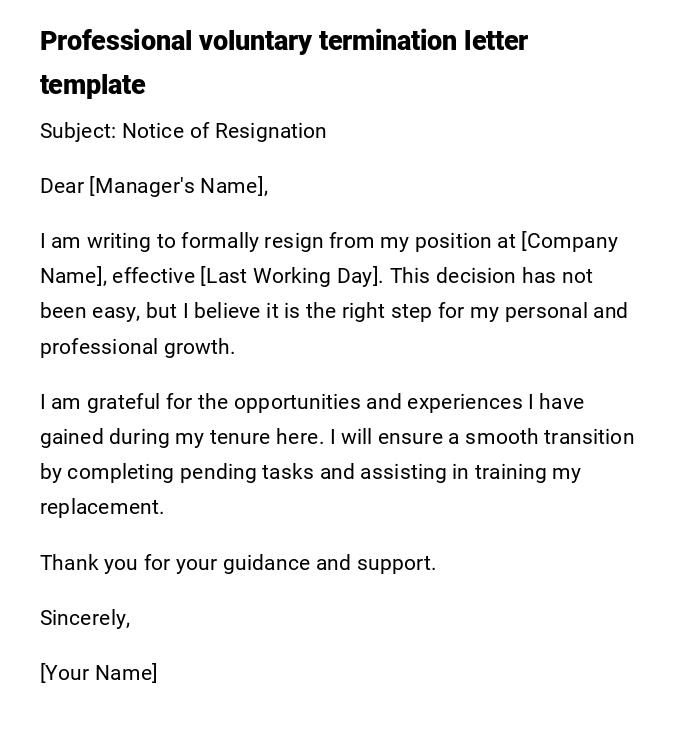
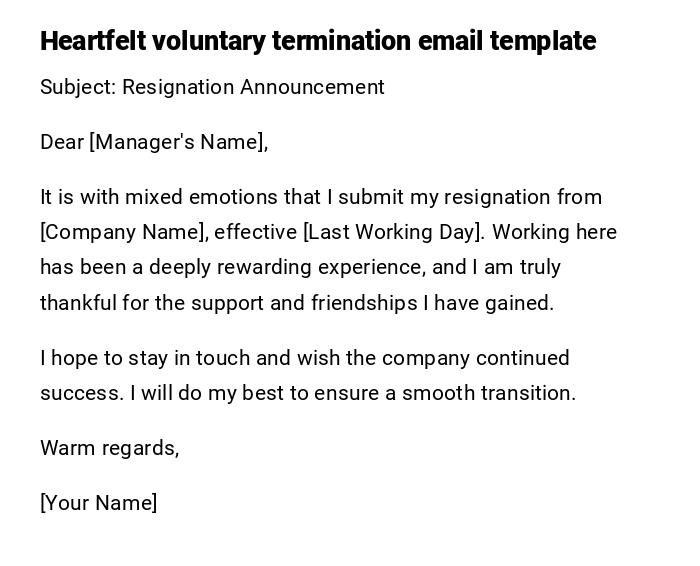
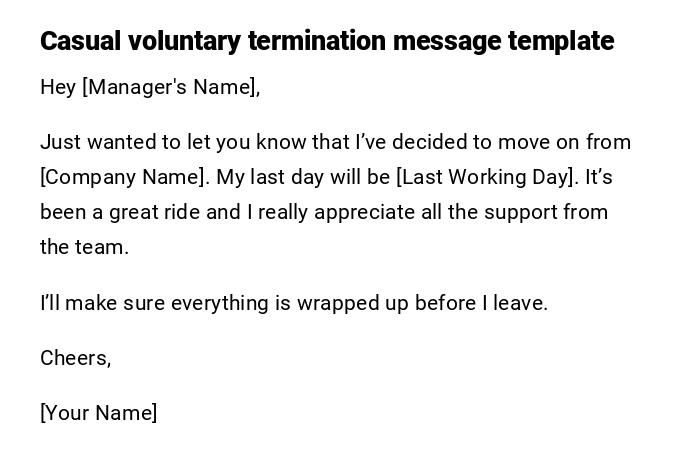
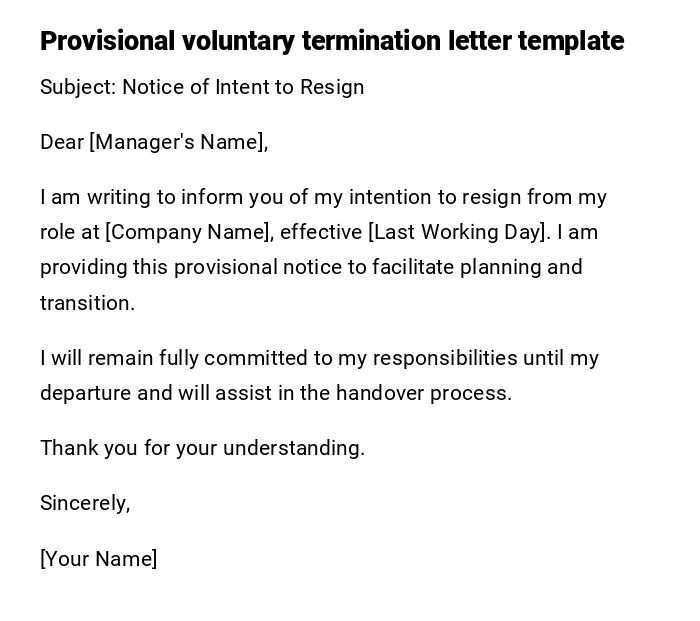
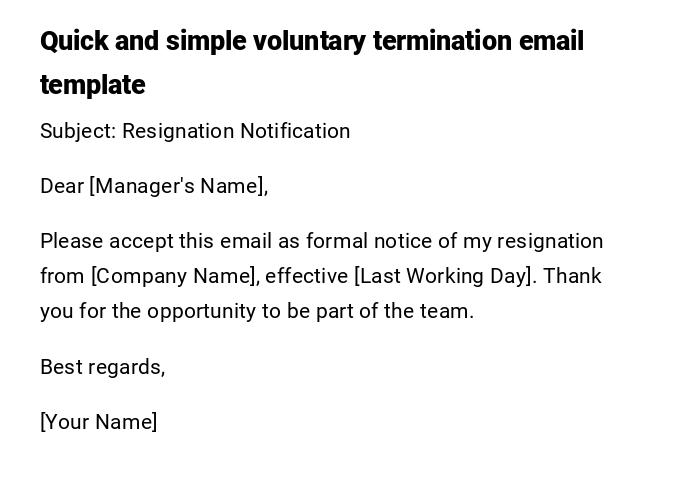
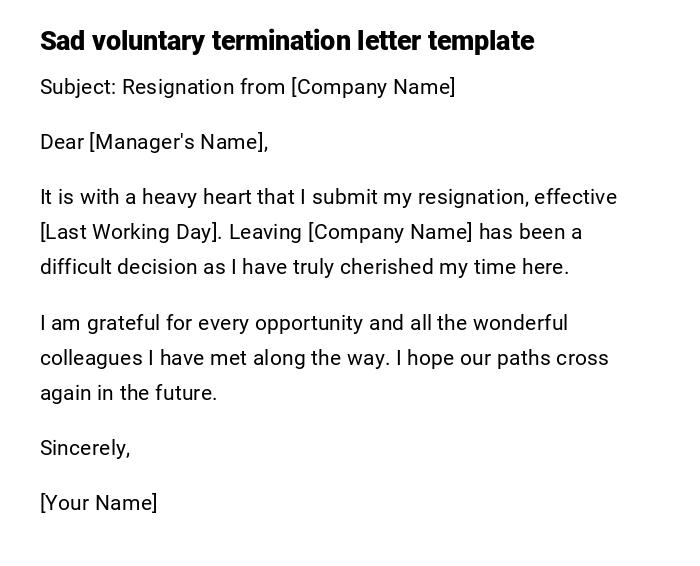

 Download Word Doc
Download Word Doc
 Download PDF
Download PDF